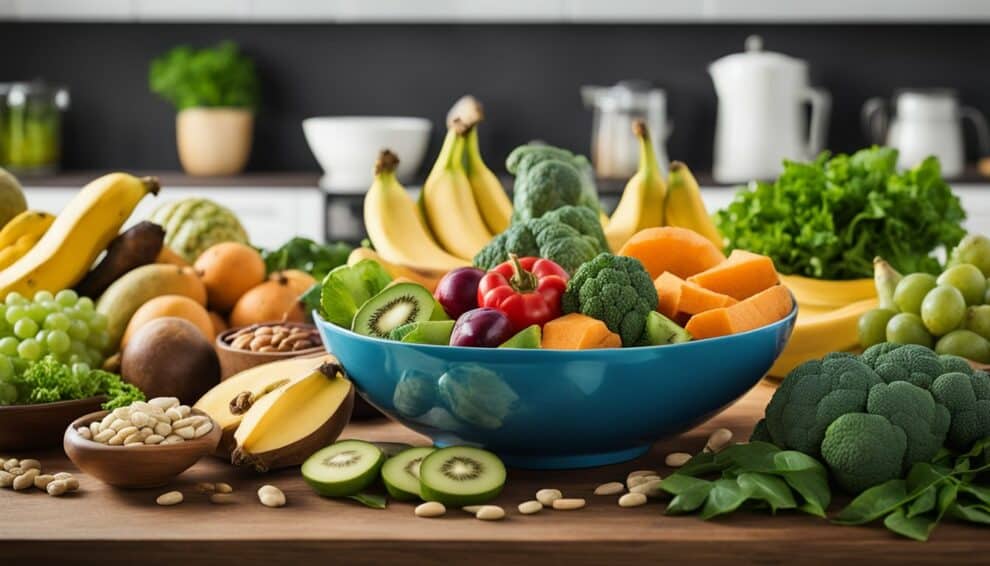Potassium plays a crucial role in maintaining your heart health, and if you’re following a raw diet, it’s important to ensure that you are getting enough of this vital mineral.
Your heart relies on potassium to help regulate its rhythm, blood pressure, and overall function.
With a raw diet, you focus on consuming uncooked and unprocessed plant-based foods, which can be an excellent source of this nutrient.

Understanding how to maintain adequate potassium levels within a raw diet can be key to supporting your heart.
Many raw fruits, vegetables, and greens naturally contain high amounts of potassium.
For example, a medium banana has about 420 mg of potassium, and avocados are another excellent source.
By incorporating a variety of potassium-rich foods, you can help ensure your heart muscles function properly and reduce your risk of cardiovascular issues.
As you build your raw diet, remember that it’s not just about the foods you eat; it’s also about how these foods support your body.
Paying close attention to food choices will make sure that you’re not only enjoying the vibrant flavors of raw foods but also proactively contributing to your heart health.
Keeping potassium on your radar is a simple yet effective step towards a healthier heart.
Understanding Potassium’s Role in the Body

Potassium is more than just a mineral; it’s a key player in maintaining your heart health and overall well-being.
Dive in to discover how this essential nutrient functions within your body.
Essential Nutrient Functions
Potassium is crucial for your cardiovascular system.
It helps regulate blood pressure by counteracting the effects of sodium and easing tension in the blood vessel walls.
This role is vital since maintaining a healthy blood pressure can significantly reduce your risk of cardiovascular disease.
Your muscles and nerves also rely on potassium.
The mineral is necessary for proper muscle function, allowing them to contract smoothly.
Moreover, it helps in the transmission of nerve signals, which are essential for muscle movements and heartbeat regulation.
The kidneys play a major role in controlling the levels of potassium in your body.
They help balance the amount of potassium by filtering excess amounts into your urine.
This regulation is important because too much potassium can be harmful, just as too little can be problematic.
Sources of Potassium in a Raw Diet

Incorporating a variety of potassium-rich foods into your raw diet is crucial for heart health.
Your body depends on this mineral for proper function, and a raw diet provides many delicious options to meet your needs.
Fruits and Vegetables
Fruits and vegetables are the cornerstone of any raw diet and are packed with potassium. Here’s a list to guide your choices:
- Bananas: A medium banana offers about 420 mg of potassium.
Bananas are versatile and can be enjoyed alone or sliced into salads.
- Oranges: Savor the citrusy delight of oranges to quench your thirst while gaining a good dose of potassium.
- Tomatoes: Whether cherry, heirloom, or roma, tomatoes are an excellent addition to your salad or as a snack.
- Spinach: A single cup of raw spinach can boost your potassium intake significantly.
- Avocados: Slice them, dice them, or mash them; avocados are not only rich in healthy fats but also potassium.
- Potatoes: Yes, you can enjoy potatoes raw! Try spiralizing them for a twist in your salads.
Nuts, Grains, and Legumes
These are more than just protein powerhouses in a raw diet; they’re also valuable sources of potassium.
- Beans: Choose from a variety such as adzuki or black beans.
Soak them, and they’re ready to be incorporated into your meals.
- Peas: Fresh peas are a sweet treat and can be enjoyed alone or thrown into a salad.
By focusing on these potassium-packed foods, you can ensure your raw diet supports your heart health effectively.
Balancing Potassium with Other Dietary Factors

When managing your heart health through a raw diet, it’s essential to consider how potassium interacts with sodium and other minerals.
Getting these balances right will support your cardiovascular system effectively.
Sodium-Potassium Interaction
Potassium and sodium have a delicate balancing act in your body.
High sodium intake, often from salt, can lead to increased blood pressure.
On the flip side, potassium helps counteract the effects of sodium and can aid in lowering blood pressure.
For those following raw diets, using salt substitutes that are potassium-based can help maintain this balance.
It’s recommended to align with the Dietary Guidelines for Americans and the principles of the DASH diet, which emphasizes reduced sodium and increased potassium consumption.
- Recommended Sodium Intake: less than 2,300 milligrams per day
- Encouraged Potassium Intake: at least 4,700 milligrams per day
Influence of Other Minerals
Your heart health is not only influenced by your potassium and sodium levels but also by your intake of calcium and magnesium.
These minerals work synergistically with potassium to support heart function and overall health.
Calcium plays a role in muscular contraction, including the heart muscle, while magnesium is involved in over 300 biochemical reactions in the body, many of which contribute to proper heart rhythm and blood pressure regulation.
- Adequate Intake Levels:
- Calcium: 1,000-1,300 milligrams per day
- Magnesium: 310-420 milligrams per day
Raw diets typically contain foods high in these minerals, but it’s important to know the Dietary Reference Intakes to ensure you’re meeting your needs through diet alone.
Incorporating a variety of nuts, seeds, leafy greens, and fruits will help you meet these mineral targets.
Potassium Intake Recommendations

Potassium is essential for your heart health, and ensuring you get enough through your diet is crucial.
The right amount can support proper heart function and blood pressure regulation.
Adequate Intake Guidelines
According to the National Academies of Sciences, Engineering, and Medicine, the Adequate Intake (AI) for potassium for adults is set at:
- Men: 3,400 milligrams per day
- Women: 2,600 milligrams per day
These amounts are considered sufficient for maintaining heart health and should be viewed as goals in your daily diet.
Special Considerations for Different Populations
While the AI provides a general benchmark, specific populations may have different needs:
- Blacks: Research suggests that black populations may be more sensitive to the blood pressure-lowering effects of potassium.
You might benefit from discussing personal intake goals with a healthcare provider.
- Non-Hispanic Blacks/Whites: There may be variations in recommended intakes based on individual dietary reference intakes, which consider factors like age, sex, and race.
Keep in mind that the Dietary Reference Intakes include the Estimated Average Requirement (EAR), which is the average daily intake level estimated to meet the requirements of half the healthy individuals in a group; and the Tolerable Upper Intake Level (UL), beyond which there is a risk of adverse effects.
It is essential to balance your intake and not exceed the UL to avoid potential health issues.
Addressing the Risks of Imbalance

Maintaining the right balance of potassium is crucial for your heart health.
Too much or too little can lead to serious health issues, including arrhythmias, high blood pressure, and an increased risk of stroke.
Hypokalemia and Hyperkalemia
Hypokalemia, defined by lower than normal potassium levels, can weaken muscle function, including the heart muscle, and increase the risk of kidney stones.
On the flip side, hyperkalemia occurs when potassium levels are too high.
This can result from chronic kidney disease or diabetes and may lead to dangerous heart rhythms.
You can usually meet your daily potassium needs through your diet, with a healthy blood level being between 3.5 and 5.0 milliequivalents per liter (mEq/L).
- Signs of Hypokalemia: Weakness, fatigue, muscle cramps
- Signs of Hyperkalemia: Palpitations, muscle pain, confusion
Chronic Disease and Potassium Regulation
Managing potassium is particularly vital if you have a chronic disease like heart disease or kidney disorders.
These conditions can impair your body’s ability to regulate potassium levels, which influences blood pressure and heart function.
Ensuring you get 2,600 milligrams to 3,400 milligrams of potassium daily, depending on your gender, helps mitigate these risks.
- Kidney Disorders: Can cause both hypokalemia and hyperkalemia
- Heart Disease and Stroke: Potassium helps regulate blood pressure and vascular health
Remember, a balanced raw diet should include foods like leafy greens, avocados, and bananas that are rich in potassium.
It’s essential to monitor your potassium intake, especially if you’re at risk of—or currently managing—any chronic conditions.















